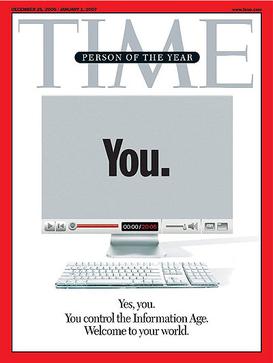To encourage engagement and ownership, we must stop trying to do things to each other.
People often ask me, “How do you make people share?” or “How do you make people adopt social tools?” or, more generally, “How do you make people more engaged?”.
That little word “make” comes up time and time again. It’s so apparent when it does, and I wince whenever I hear it.
And even when I point it out, and people apologize for it and say, “Oh, I did not mean that – it was just a turn of phrase,” I am still not convinced – deep down, we all feel the need to “make people different” – to change them. Wouldn’t it be so good if everyone was just like me!
But it is more subtle. The other thing I often get asked – is, “How do you incentivize people?”, “How do you motivate them?” or “How do you get buy-in?“.
Think about it. Once again, we are trying to do things to people – incentivize or motivate them, get them “to buy into something” – seeking to change them.
And then, often, I will hear people say, or catch myself saying, “How do you help people to see things differently?” or “How do you support them in this change?”
But notice, in all these statements, the assumption is that we know best, that we have the correct answers, that others do not, and that we need to intervene and correct them – even if we do wrap it all up in cotton wool and say “help” rather than “make.”
The grave issue is that we think about the world as “us and them.” We need to be thinking in terms of “we.”
Rather than “I am here to help you.” which implies you require help, and I am your savior, we need to approach people with “How can we work better together.” And we need to mean that. It is not some ploy to enact our predetermined agenda.
It’s about approaching them without an agenda other than to work with them better.
I often see another strange phenomenon; managers will often tell me that the biggest excuse that their staff use for not changing, doing things differently, or sharing their knowledge is that they “have no time.” But a little later, I ask them, “How do you share your knowledge?” They reply, “If only I had the time!” They use the same excuse!

Each year in the December issue, Time Magazine announces their person of the year, and in the December 2006 issue, in reaction to Web 2.0, they announced that person as “You” and added “Yes, You. You control the Information Age. Welcome to your world.”
I would have phrased it somewhat differently if I had been the editor.
“We, yes, we. We control the Information Age. Welcome to our world.”
So some thoughts for this new world
1. Stop doing things to people
2. Become the change we wish to see
3. Start to work together
We are moving to a participatory “WE” world. So whenever we initiate anything, we must ask ourselves: “Am I trying to do things to people, or am I approaching them with a genuine view to work together with them?”
So many of the problems we face in our organizations and society revolve around the fact that we are always trying to do things to each other – to change or manipulate them.
We must stop doing things to each other!
- measuring them
- appraising them
- judging them
- rewarding or bribing them
- threatening them
- holding them accountable without their agreement
- disciplining them
Read between the lines on anything written about managing people, and you will notice it is more about manipulating other people to do what we want them to do rather than engaging and working with them.
How do you make people share? (2005) | David Gurteen (source)Posts that link to this post
- Ownership, Not Buy-in We need to move from buy-in to ownership
- Positive Deviance in Action How everyday outliers spark lasting community change
POST NAVIGATION
CHAPTER NAVIGATION
SEARCH
Blook SearchGoogle Web Search
If you enjoy my work and find it valuable, please consider giving me a little support. Your donation will help cover some of my website hosting expenses.
Make a donation

